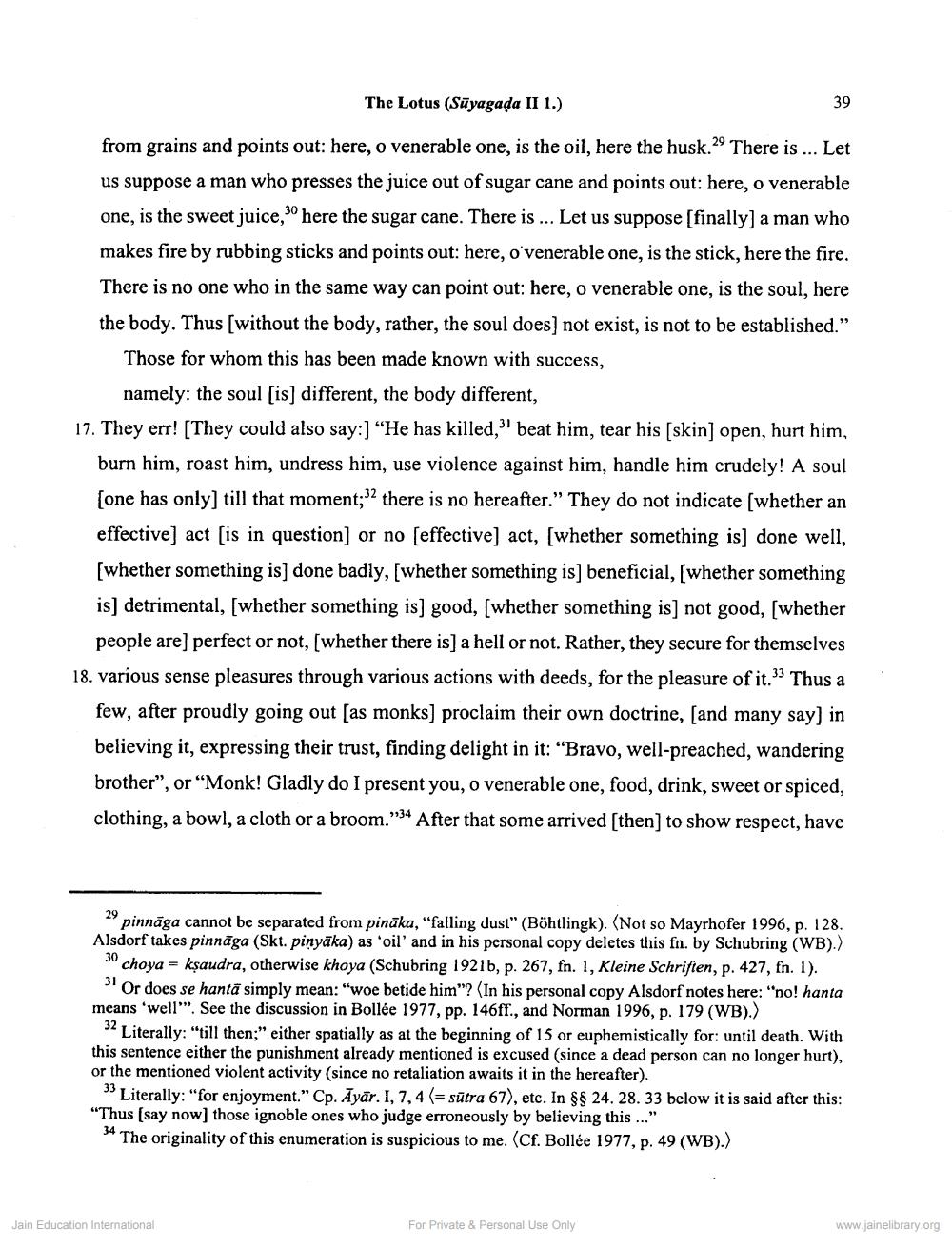________________
The Lotus (Suyagaḍa II 1.)
from grains and points out: here, o venerable one, is the oil, here the husk.29 There is ... Let us suppose a man who presses the juice out of sugar cane and points out: here, o venerable one, is the sweet juice,30 here the sugar cane. There is... Let us suppose [finally] a man who makes fire by rubbing sticks and points out: here, o venerable one, is the stick, here the fire. There is no one who in the same way can point out: here, o venerable one, is the soul, here the body. Thus [without the body, rather, the soul does] not exist, is not to be established." Those for whom this has been made known with success,
namely: the soul [is] different, the body different,
17. They err! [They could also say:] "He has killed," beat him, tear his [skin] open, hurt him. burn him, roast him, undress him, use violence against him, handle him crudely! A soul [one has only] till that moment; there is no hereafter." They do not indicate [whether an effective] act [is in question] or no [effective] act, [whether something is] done well, [whether something is] done badly, [whether something is] beneficial, [whether something is] detrimental, [whether something is] good, [whether something is] not good, [whether people are] perfect or not, [whether there is] a hell or not. Rather, they secure for themselves 18. various sense pleasures through various actions with deeds, for the pleasure of it." Thus a few, after proudly going out [as monks] proclaim their own doctrine, [and many say] in believing it, expressing their trust, finding delight in it: "Bravo, well-preached, wandering brother", or "Monk! Gladly do I present you, o venerable one, food, drink, sweet or spiced, clothing, a bowl, a cloth or a broom." After that some arrived [then] to show respect, have
39
29
pinnaga cannot be separated from pināka, "falling dust" (Böhtlingk). (Not so Mayrhofer 1996, p. 128. Alsdorf takes pinnaga (Skt. pinyaka) as 'oil' and in his personal copy deletes this fn. by Schubring (WB).) 30 choya kṣaudra, otherwise khoya (Schubring 1921b, p. 267, fn. 1, Kleine Schriften, p. 427, n. 1).
31
Or does se hantä simply mean: "woe betide him"? (In his personal copy Alsdorf notes here: "no! hanta means 'well"". See the discussion in Bollée 1977, pp. 146ff., and Norman 1996, p. 179 (WB).)
32 Literally: "till then;" either spatially as at the beginning of 15 or euphemistically for: until death. With this sentence either the punishment already mentioned is excused (since a dead person can no longer hurt), or the mentioned violent activity (since no retaliation awaits it in the hereafter).
33 Literally: "for enjoyment." Cp. Ayar. I, 7, 4 (= sūtra 67), etc. In §§ 24. 28. 33 below it is said after this: "Thus [say now] those ignoble ones who judge erroneously by believing this..."
34
The originality of this enumeration is suspicious to me. (Cf. Bollée 1977, p. 49 (WB).)
Jain Education International
For Private & Personal Use Only
www.jainelibrary.org




